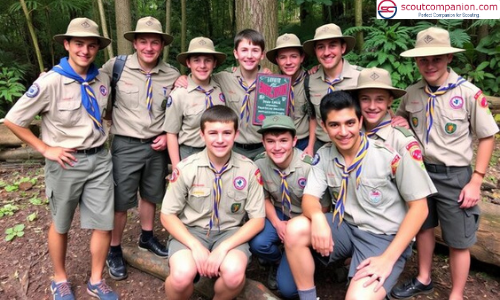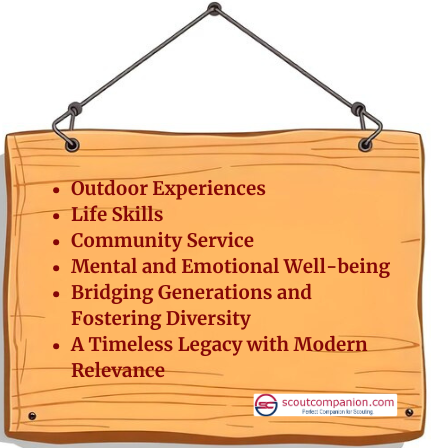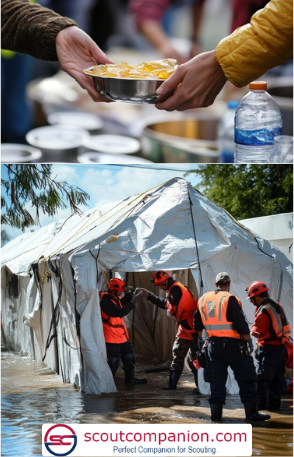In today’s fast-paced, technology driven world, scouting has become more essential than ever. While modern life has taken place in every one’s life, it has also created challenges like reduced physical activity, lack of connection to nature, and reduced social skills. Scouting bridges this gap through experience with nature that nurtures both the body and the soul, and outdoor activities like hiking, camping, and community involvement. These activities in scouting encourage the youths to step out of their home and engage with the world around them. To learn more about why scouting is more relevant than ever and benefits of scouting for youth life, you can explore the Boy Scouts of America Official Site.

Table of Contents
Introduction
In an age where technology dominates daily life, the traditional outdoor activities have been replaced by screen times. This results in the need for scouting as a vital program for youths as it mainly focuses on outdoor adventure, leadership, and community service. Scouting provides a counterbalance to the sedentary and isolated life habits that were practiced in modern life. Apart from physical activities, scouting enhances youths with essential skills, character building, accountability and community engagement by taking away all the shyness that were developed as a result of isolated modern life.

By blending traditional activities with modern needs, scouting offers an adaptable framework for youth development making it an indispensable opportunity for raising capable, compassionate, and responsible individuals. This article talks about the importance of scouting and the changes it can make in today’s youth’s life through the following six ways:
- Outdoor Experiences: Building Resilience and Appreciation for Nature
- Life Skills: Preparing for a Successful Future
- Cultivating Empathy and Civic Responsibility
- Mental and Emotional Well-being: Addressing Modern Challenges
- Bridging Generations and Fostering Diversity
- A Timeless Legacy with Modern Relevance
Benefits of Scouting for Youth’s
Scouting has long been recognized as a powerful tool for shaping young minds and instilling essential life skills. For today’s youth, it holds even greater significance in a world increasingly dominated by technology, social pressures, and a lack of opportunities for outdoor engagement. Scouting provides a unique platform for children and teenagers to grow physically, mentally, and emotionally while fostering teamwork, leadership, and resilience. The following are the 10 benefits of scouting for youth’s:
- Leadership Skills : Leadership in scouting means guiding a team, setting a good example, and helping others grow. A scout leader teaches responsibility, teamwork, and problem-solving. They inspire confidence, lead by actions, and support everyone’s development. Leadership in scouting builds character, strengthens bonds, and prepares individuals to face challenges with courage and integrity.
- Teamwork and Collaboration : Teamwork and collaboration in scouting teach valuable life skills. Scouts work together to solve problems, complete tasks, and achieve goals. Everyone contributes their strengths, supporting each other through challenges. This builds trust, leadership, and a sense of unity. By learning to work as a team, scouts prepare for future success.
- Life and Survival Skills : Life and survival skills in scouting teach you how to adapt and thrive in nature. You learn essential skills like building shelters, starting fires, finding food, and staying safe. It also fosters teamwork, leadership, and self-reliance, helping you face challenges confidently, both in the wilderness and in everyday life.
- Self-Confidence and Independence : Self-confidence and independence are core values in scouting. Scouts learn to believe in themselves by tackling challenges, making decisions, and solving problems on their own. Through outdoor activities, team projects, and leadership roles, they develop the courage to face difficulties and trust their abilities. Independence helps them take responsibility for their actions and grow as individuals. Scouting teaches that failure is part of learning, and with confidence and independence, they can achieve great things in life.
- Connection with Nature : In scouting, connection with nature is essential. Scouts explore forests, mountains, and rivers, learning to respect and protect the environment. They observe wildlife, camp under the stars, and understand nature’s beauty. This bond fosters responsibility, survival skills, and a deeper appreciation for the world around them, shaping them into mindful individuals.
- Moral and Ethical Values : Moral and ethical values in scouting teach honesty, respect, kindness, and responsibility. Scouts learn to help others, respect nature, and act with integrity. These values build strong character, guiding scouts to make good decisions and contribute positively to their community. Scouting encourages a life of service, fairness, and self-discipline.
- Community Service : Community service in scouting teaches scouts the value of helping others. Scouts participate in activities like cleaning parks, planting trees, or assisting the elderly. These actions build character, develop teamwork, and create a sense of responsibility. By serving the community, scouts learn the importance of giving back and making a positive impact.
- Resilience and Problem-Solving : Resilience and problem-solving are key skills in scouting. Scouts face challenges like tough terrains, bad weather, or unexpected situations. They learn to stay calm, adapt, and think critically to find solutions. These experiences build confidence, teamwork, and a never-give-up attitude, preparing them for real-life problems with a positive mindset.
- Social Skills and Friendships : Scouting helps build social skills and strong friendships. Scouts learn teamwork, communication, and problem-solving while working on activities together. Sharing challenges and adventures creates trust and lasting bonds. It teaches respect, empathy, and cooperation, which help in making friends and getting along with others in life.
- Health and Physical Fitness : In scouting, health and physical fitness are important for building strong bodies and minds. Scouts learn to stay active, eat healthy, and care for their well-being. They take part in outdoor activities like hiking, swimming, and camping, which help improve strength, stamina, and overall fitness.
Outdoor Experiences: Building Resilience and Appreciation for Nature

One of the core principles of scouting is its emphasis on outdoor activities. Camping trips, hiking expeditions, and nature-based learning provide invaluable opportunities for young people to connect with the environment. These experiences are not just recreational. They serve as a platform for physical and mental growth, nurturing body, mind, and soul. Navigating the challenges of outdoor activities such as setting up tents, cooking meals over a campfire, or reading a map helps youth develop problem-solving skills, resilience, and self-reliance.
In today’s world, where children spend an average of 7-10 hours daily on screens, the value of these activities cannot be overstated. Outdoor experiences encourage youth to unplug from the virtual worlds and explore and engage with the real world around them. They foster a deeper appreciation for nature, which is crucial for cultivating environmental stewardship.
Furthermore, outdoor activities provide a unique sense of adventure and discovery, sparking curiosity and a spirit of exploration in scouts. Whether it’s navigating a dense forest trail, enduring an unexpected rainstorm during a hike, or encountering wildlife in their natural habitat, these experiences challenge youth to adapt and thrive outside their comfort zones. Such exposure fosters mental toughness and adaptability.
Engaging with the unpredictability of nature also teaches patience, problem-solving, and the importance of preparation. Scouts learn to assess risks, plan ahead, and work collaboratively to overcome obstacles by adapting quickly according to that situation. skills that are transferable to every aspect of life from childhood to adulthood and from professional life to personal life. Beyond practical benefits, outdoor activities ignite a deep sense of wonder and respect for the natural world and create awareness to protect the environment which aligns with the LNT(Leave No Trace) Principle of scouting. This connection not only enhances personal well-being but also instills a responsibility to preserve the environment for future generations.
In addition to personal growth, outdoor adventures promote physical health. Activities like hiking, climbing, and camping ensure that youth stay active, combating the sedentary lifestyle prevalent in modern society. These enriching experiences allow scouts to unplug from technology and form meaningful connections with their peers, mentors, and surroundings, creating memories and life lessons that endure well into adulthood.
Life Skills: Preparing for a Successful Future

Scouting goes beyond teaching youth how to tie knots or start a fire. It imparts life skills that have lifelong relevance. Communication, teamwork, time management, and goal-setting are just a few examples of the competencies scouts develop through their activities. These skills are directly applicable in academic, professional, and personal contexts, making scouting a valuable complement to formal education.
Teamwork is another critical skill emphasized in scouting which can be gained from team-building activities like working together to pitch a tent or collaborating on a service project. Scouts learn to value diverse perspectives and build trust within a group. Additionally, scouting instills time management and goal-setting skills. Participants are encouraged to work toward earning badges and achieving ranks, which teaches them to plan, prioritize, and persist in pursuing their goals.
Moreover, scouting enhances leadership abilities in a practical manner. Scouts often take on roles within their troop or participate in projects that require them to lead teams. This real-world leadership experience builds confidence and teaches them how to motivate and manage others.This skill set that will serve them well in any career. Additionally, scouting emphasizes accountability, teaching youth the importance of commitment and staying trustworthy.Practical skills like first aid, financial management, and cooking are also integral to the scouting experience. These skills prepare young people to handle real-life situations with competence and confidence.
For example, knowing how to administer first aid in an emergency could save lives, while understanding basic budgeting principles can lead to better financial decisions in adulthood.
Community Service: Cultivating Empathy and Civic Responsibility

One of the hallmarks of scouting is its commitment to community service. Scouts are encouraged to identify local issues and take action to address them, whether by organizing food drives, cleaning up parks, or helping the elderly. These activities teach youth the importance of giving back, fostering a sense of empathy and social responsibility by knowing their surroundings.
In a time when communities are increasingly fragmented, scouting promotes unity and a collective spirit. Working on service projects helps youth understand the value of collaboration and the impact of collective effort. Additionally, these projects expose scouts to diverse perspectives and challenges, broadening their understanding of the world and enhancing their problem-solving abilities.
The emphasis on community service also helps young people develop a strong moral compass. By seeing the impact of their actions in the community, they learn that they have the power to make a difference. This sense of agency can inspire them to take on leadership roles in their communities, contributing to societal progress.
Community service becomes more noticeable particularly in times of emergencies. Scouts are trained to respond effectively in these times by using the skills they have learned in the scout training like first-aid, disaster preparedness and resource management to assist those who are in need.
For example, they may participate in rescue operations, distribute food and water, or help with shelter organization. These experiences not only teach them practical skills but also deepen their empathy and commitment to serving others. By witnessing the impact of their actions firsthand, scouts learn the value of selflessness and develop a lifelong dedication to civic responsibility.
Mental and Emotional Well-being: Addressing Modern Challenges
The pressures of modern life, including academic demands, social media influence, and global uncertainties, can make insecurities on young people’s mental health. Scouting offers a supportive environment where youth can build strong relationships, express themselves, and gain a sense of belonging. This builds their self-confidence and stops them from comparing themselves with others to make them feel better.
Outdoor activities and physical exercise are integral to scouting. Apart from physical fitness, they have well-documented benefits for mental health. They reduce stress, improve mood, and enhance cognitive function. Additionally, the structured yet flexible nature of scouting programs allows youth to set and achieve personal goals, boosting their self-esteem and resilience.
Scouting also emphasizes mindfulness and reflection through activities like journalism or nature walks. These practices encourage youth to slow down and connect with their thoughts and feelings, fostering emotional intelligence and understanding others through empathy. In an age where mental health challenges are on the rise, scouting provides a constructive outlet for youth to develop coping mechanisms and build inner strength.
For example, Imagine a teenager struggling with academic pressures, social media comparisons, and feelings of isolation. They feel overwhelmed, unsure how to manage their time effectively, and disconnected from others.Joining a scout troop provides them with a supportive community and a structured environment to develop coping mechanisms.
The scout troop leader encourages open communication, allowing the teenager to express their challenges without judgment. Over time, the teenager begins to feel more connected, gains self-confidence, and learns to set achievable goals. The physical activity involved in hiking and camping boosts their mood and energy levels, while the sense of belonging eliminates the feelings of loneliness.
The above scenario illustrates how scouting addresses modern mental health issues by combining community support, outdoor activities, and personal growth opportunities.
Bridging Generations and Fostering Diversity

Scouting is unique in its ability to bring together people of different ages, backgrounds, and cultures. The mentorship aspect of scouting, where older scouts or adult leaders guide younger members, creates a sense of inter-generational connection. This dynamic allows youth to learn from the experiences and wisdom of their elders while also contributing fresh perspectives.
Furthermore, scouting promotes inclusiveness and diversity. Troops often consist of members from various socioeconomic, cultural, and religious backgrounds, fostering an environment where differences are celebrated rather than isolation. This exposure helps youth develop cultural competence and an appreciation for diversity by understanding and respecting other cultures in this increasingly interconnected world.
For example, imagine a diverse scout troop working on a community garden project. The group includes youth from various cultural backgrounds and an adult leader with decades of gardening experience. While the leader teaches the scouts about planting techniques and sustainability, the scouts share insights about how similar gardens are cultivated in their families’ home countries, enriching everyone’s understanding of global agricultural practices.
The diversity within scouting fosters cultural awareness and inclusiveness. Scouts learn to appreciate differences and work collaboratively toward common goals. Things like celebrating cultural festivals, learning phrases from other’s mother tongues, or simply sharing their mother country’s meals with others break down stereotypes and build mutual respect for one another, creating a more inclusive society where everyone feels valued and empowered to contribute.
A Timeless Legacy with Modern Relevance
Even Though scouting has its roots in the early 20th-century, its principles are more relevant than ever in addressing modern day life challenges. By blending traditional values with modern innovations, scouting continues to adapt and meet the needs of today’s youth. Scouting programs now-a-days incorporate STEM (science, technology, engineering, and math) and service-oriented activities alongside outdoor activities. This prepares the youth to meet the demands of the rapidly changing world by bridging the gap between academic education and real-world readiness.
Scouting also focuses on developing a sense of purpose and belonging in a world where many young people face feelings of isolation, uncertainty, and mental health challenges. Through the structure and support of the scout program, youth gain a sense of identity and direction. The friendships built within scouting provide emotional support, offering a safe space where young people can share experiences and struggles. This peer network, combined with mentorship from adult leaders, gives scouts guidance and confidence as they face challenges in life.
In a world of quick success and superficial achievements, scouting teaches the importance of patience, hard work, and ethical behavior. Scouts work towards earning merit badges, advancing through ranks, and completing service projects, all of which require patience, sustained effort, responsibility, and integrity. These experiences help youth understand that true success comes from dedication, collaboration, and doing the right thing, even when it’s difficult.
By combining timeless values with a modern approach to education, community service, and personal growth, scouting equips young people not just for the challenges of today, but also for the opportunities of the future. It empowers them to become responsible, compassionate, and engaged citizens who are prepared to lead and contribute in an ever-changing world.
Conclusion
In a world filled with distractions and challenges, scouting offers a beacon of hope and direction for young people. Its focus on outdoor experiences, life skills, and community service provides a holistic approach to development that addresses physical, mental, and emotional health. By fostering resilience, empathy, and leadership, scouting prepares youth to face life’s complexities and make meaningful contributions to their communities. As society continues to evolve, the foundational values of scouting such as honesty, kindness, respect, and responsibility should remain steadfast. These principles not only benefit individual scouts but also contribute to building stronger communities. For today’s youth, scouting is not just an extracurricular activity; it is a pathway to a brighter future with confidence, compassion, and purpose.



